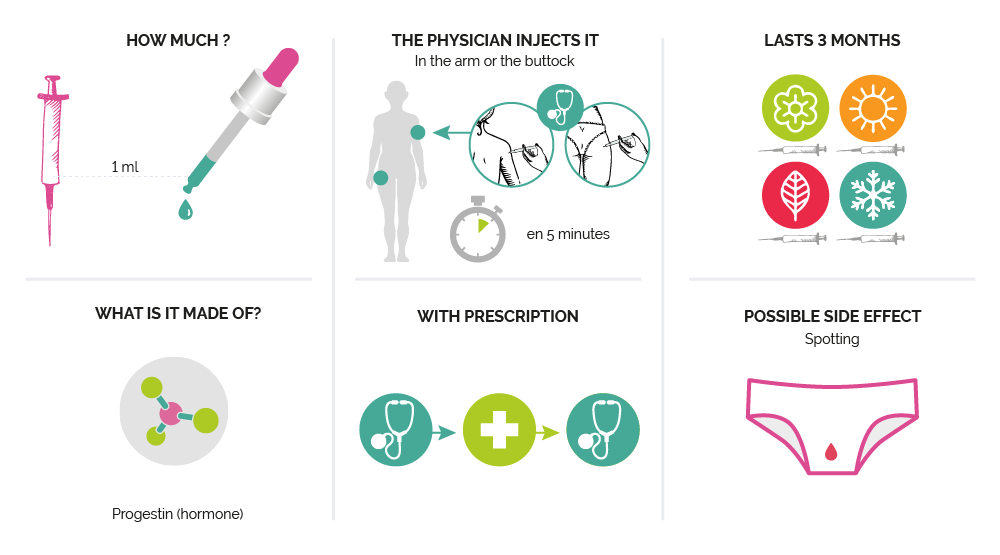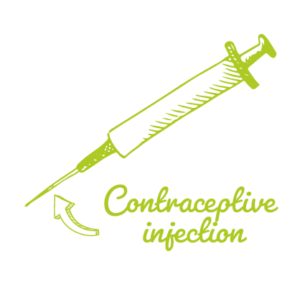Contraceptive Injections
Contraceptive Injections also known as Progestin only injectables are done by a physician or a gynaecologist every 3 months.
* Practical effectiveness: when measured under conditions of current use (taking into account omissions, failures, etc.)
** Theoretical effectiveness: when observed under conditions of perfect use (without problems of use and without interaction with other medicine)
Source: effectiveness percentages are taken from WHO (2018)
HOW DOES IT WORK?
A progestin hormone is injected directly in the muscle. This dosage is effective in blocking ovulation for 3 months. Many people who start with an injectable progestin initially have irregular periods and then gradually stop having it at all. However, some people experience bleeding.
INTERESTING FIGURES AND DETAILS

HOW TO USE IT?

BACKGROUND
Make an appointment to a physician or gynaecologist who will provide you a prescription.
STEP 1
Once the injection is purchased in a pharmacy, go back to your physician or gynaecologist.
STEP 2
Every three months, go back to your physician, gynaecologist or nurse who will administer an injection in the buttock muscle, under the skin or upper arm.
WHERE TO GET IT?
Starting 1 April 2023, this contraceptive is delivered free of charge on medical prescription in any Luxembourg pharmacy to people affiliated with the National Health Fund, with no age limit.
For more information: click here.
This contraceptive can also be delivered for free at the Family Planning, including to people not covered by National Health Fund.
Progestin only injectables cost on average 37€* for 1 year (4 injections).
*(This price is an average indication that may vary)
Advantages
- Progestin only injectables are a reliable contraceptive method
- You do not have to think about it every day or every time you are having sexual intercourse.
- Suitable for women who are breastfeeding
Bon à savoir
- Injectable progestin does not protect against sexually transmitted infections. Therefore, remember to use condoms.
- If you experience any side effects, they may stay until the end of the 3 months. In any case, do not hesitate to talk about any discomfort with your health professional.
- There is a risk of losing bone density: your physician must assess the risks to your body with you, depending on your age and your health history. It is advisable to take calcium and vitamin D at the same time, as this type of contraception can reduce bone density.
- Your menstrual cycle will change and can become irregular. This method does not allow you to predict or postpone your period.
- You must see your physician every three months.
- Not suitable for women who would like to become pregnant shortly after stopping contraception, as it may take longer to return to fertility.

FREQUENTLY ASEKD QUESTIONS
What can be done in case of side effects after the injection?
If you have any side effects from the injection, they may only last for a few days or they may last for the next 3 months until the product is no longer in the body.
Contact a health professional if you have any unwanted side effects.
Is the injection painful?
A small amount of pain at the injection site may be felt, but this lasts for a few hours at most.
Can I receive a contraceptive injection and a vaccine at the same time?
Yes, no problem. Vaccination has no effect on the effectiveness of the injection and vice versa. The vaccination triggers an immune reaction, while the progestin injection will release synthetic hormones. Both processes can take place at the same time, without any danger for your health, as they are independent from each other. Progestin can also be injected into the buttocks.
What happens if I don't get the next injection on time?
The injection must be given every 13 weeks (i.e. 91 days). There is a risk of pregnancy if you are more than 7 days late (14 weeks since the last injection). In this case, remember to protect yourself during intercourse, and consult a health professional to find out what you need to do.
I'm going on a trip for a whole year, how do I do it?
As the injection is a widely available contraceptive throughout the world, it is generally not difficult to obtain it. If you are planning to be away for more than 3 months, it is important to discuss this with your physician who can advise you on the options available to you so that you do not break your contraceptive cover.
Does a person using injections still have period?
Progestin injections can induce a complete absence of menstruation (also called amenorrhoea). However, the percentage of people experiencing this side effect varies according to the number of doses received. The more doses you received, the more common it is to have amenorrhoea. Irregular bleeding is also very common.
Is it true that contraceptive injections can cause osteoporosis in the long term?
Progestin injections are associated with a temporary reduction in bone mineral density (reference: CDC-Mec). However, this reduction is usually reversible depending on the length of time the injections have been used and the age. For example, adolescence is a crucial period for bone growth. Therefore, it is not advisable to use this contraceptive until you have reached your full growth level.
Having low bone mineral density is a risk factor for the development of osteoporosis and fractures. It is therefore advisable to re-discuss contraception after 2 years of using the injections.
When is the injection effective?
If the injection is given within the first 7 days of the cycle, the first day of the cycle being the first day of the period, then the injection is directly effective.
If the injection is given at any other time in the cycle, additional contraception must be used for 7 days after the injection.
Once the first injection has been given, it is important to discuss with a physician the follow-up for the next injections in order to respect the 13-week deadline. It will not be necessary to use an additional contraceptive again if you respect the injection deadlines.



